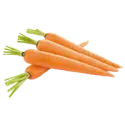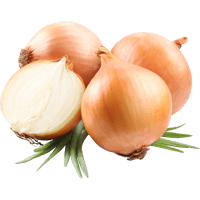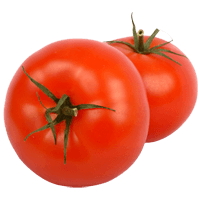Carrots, canned, regular pack, drained solids nutrition: calories, carbs, GI, protein, fiber, fats
*all the values are displayed for the amount of 100 grams
Top nutrition facts for Carrots, canned, regular pack, drained solids

| Calories ⓘ Calories for selected serving | 25 kcal |
| Net Carbs ⓘ Net Carbs = Total Carbohydrates – Fiber – Sugar Alcohols | 4 grams |
| Acidity (Based on PRAL) ⓘ PRAL (Potential renal acid load) is calculated using a formula. On the PRAL scale the higher the positive value, the more is the acidifying effect on the body. The lower the negative value, the higher the alkalinity of the food. 0 is neutral. | -3.1 (alkaline) |
Carrots, canned, regular pack, drained solids calories (kcal)
| Calories for different serving sizes of carrots, canned, regular pack, drained solids | Calories | Weight |
|---|---|---|
| Calories in 100 grams | 25 | |
| Calories in 1 slice | 1 | 2.8 g |
| Calories in 1 cup, sliced | 37 | 146 g |
| Calories in 1 cup, mashed | 57 | 228 g |
Mineral coverage chart
Mineral chart - relative view
Vitamin coverage chart
Vitamin A:
1674µg of 900µg
186%
Vitamin E:
2.2mg of 15mg
15%
Vitamin D:
0µg of 20µg
0%
Vitamin C:
8.1mg of 90mg
9%
Vitamin B1:
0.05mg of 1mg
4.5%
Vitamin B2:
0.09mg of 1mg
6.9%
Vitamin B3:
1.7mg of 16mg
10%
Vitamin B5:
0.41mg of 5mg
8.1%
Vitamin B6:
0.34mg of 1mg
26%
Folate:
27µg of 400µg
6.8%
Vitamin B12:
0µg of 2µg
0%
Vitamin K:
29µg of 120µg
25%
Vitamin chart - relative view
Macronutrients chart
Protein:
Daily Value: 1%
0.6 g of 50 g
0.6 g (1% of DV )
Fats:
Daily Value: 0%
0.2 g of 65 g
0.2 g (0% of DV )
Carbs:
Daily Value: 2%
5.5 g of 300 g
5.5 g (2% of DV )
Water:
Daily Value: 5%
93 g of 2,000 g
93 g (5% of DV )
Other:
0.7 g
0.7 g
Protein quality breakdown
Tryptophan:
24mg of 280mg
8.6%
Threonine:
396mg of 1,050mg
38%
Isoleucine:
159mg of 1,400mg
11%
Leucine:
210mg of 2,730mg
7.7%
Lysine:
210mg of 2,100mg
10%
Methionine:
42mg of 1,050mg
4%
Phenylalanine:
126mg of 1,750mg
7.2%
Valine:
144mg of 1,820mg
7.9%
Histidine:
81mg of 700mg
12%
Fat type information
Saturated fat:
0.04 g
Monounsaturated fat:
0.01 g
Polyunsaturated fat:
0.09 g
Fiber content ratio for Carrots, canned, regular pack, drained solids
Sugar:
2.5 g
Fiber:
1.5 g
Other:
1.6 g
All nutrients for Carrots, canned, regular pack, drained solids per 100g
| Nutrient | Value | DV% | In TOP % of foods | Comparison |
| Vitamin A | 558µg | 62% | 20% | |
| Calories | 25kcal | 1% | 95% |
1.9 times less than Orange
|
| Protein | 0.64g | 2% | 89% |
4.4 times less than Broccoli
|
| Fats | 0.19g | 0% | 88% |
175.3 times less than Cheese
|
| Vitamin C | 2.7mg | 3% | 34% |
19.6 times less than Lemon
|
| Net carbs | 4g | N/A | 60% |
13.4 times less than Chocolate
|
| Carbs | 5.5g | 2% | 59% |
5.1 times less than Rice
|
| Cholesterol | 0mg | 0% | 100% |
N/A
|
| Vitamin D | 0µg | 0% | 100% |
N/A
|
| Magnesium | 8mg | 2% | 87% |
17.5 times less than Almonds
|
| Calcium | 25mg | 3% | 48% |
5 times less than Milk
|
| Potassium | 179mg | 5% | 64% |
1.2 times more than Cucumber
|
| Iron | 0.64mg | 8% | 72% |
4.1 times less than Beef broiled
|
| Sugar | 2.5g | N/A | 57% |
3.6 times less than Coca-Cola
|
| Fiber | 1.5g | 6% | 43% |
1.6 times less than Orange
|
| Copper | 0.1mg | 12% | 50% |
1.4 times less than Shiitake
|
| Zinc | 0.26mg | 2% | 81% |
24.3 times less than Beef broiled
|
| Phosphorus | 24mg | 3% | 87% |
7.6 times less than Chicken meat
|
| Sodium | 242mg | 11% | 39% |
2 times less than White bread
|
| Vitamin E | 0.74mg | 5% | 51% |
2 times less than Kiwi
|
| Manganese | 0.45mg | 20% | 39% | |
| Selenium | 0.4µg | 1% | 91% | |
| Vitamin B1 | 0.02mg | 2% | 89% |
14.8 times less than Pea raw
|
| Vitamin B2 | 0.03mg | 2% | 87% |
4.3 times less than Avocado
|
| Vitamin B3 | 0.55mg | 3% | 77% |
17.3 times less than Turkey meat
|
| Vitamin B5 | 0.14mg | 3% | 86% |
8.4 times less than Sunflower seeds
|
| Vitamin B6 | 0.11mg | 9% | 62% |
1.1 times less than Oats
|
| Vitamin B12 | 0µg | 0% | 100% |
N/A
|
| Vitamin K | 9.8µg | 8% | 50% |
10.4 times less than Broccoli
|
| Folate | 9µg | 2% | 65% |
6.8 times less than Brussels sprouts
|
| Trans fat | 0g | N/A | 100% |
N/A
|
| Saturated fat | 0.04g | 0% | 88% |
163.8 times less than Beef broiled
|
| Choline | 6.3mg | 1% | 90% | |
| Monounsaturated fat | 0.01g | N/A | 93% |
1088.8 times less than Avocado
|
| Polyunsaturated fat | 0.09g | N/A | 86% |
512.8 times less than Walnut
|
| Tryptophan | 0.01mg | 0% | 97% |
38.1 times less than Chicken meat
|
| Threonine | 0.13mg | 0% | 87% |
5.5 times less than Beef broiled
|
| Isoleucine | 0.05mg | 0% | 94% |
17.2 times less than Salmon raw
|
| Leucine | 0.07mg | 0% | 94% |
34.7 times less than Tuna Bluefin
|
| Lysine | 0.07mg | 0% | 93% |
6.5 times less than Tofu
|
| Methionine | 0.01mg | 0% | 95% |
6.9 times less than Quinoa
|
| Phenylalanine | 0.04mg | 0% | 94% |
15.9 times less than Egg
|
| Valine | 0.05mg | 0% | 95% |
42.3 times less than Soybean raw
|
| Histidine | 0.03mg | 0% | 94% |
27.7 times less than Turkey meat
|
| Caffeine | 0mg | 0% | 100% | |
| Omega-3 - EPA | 0g | N/A | 100% |
N/A
|
| Omega-3 - DHA | 0g | N/A | 100% |
N/A
|
| Omega-3 - DPA | 0g | N/A | 100% |
N/A
|
Check out similar food or compare with current
NUTRITION FACTS LABEL
Nutrition Facts
___servings per container
Serving Size ______________
Serving Size ______________
Amount Per 100g
Calories 25
% Daily Value*
0.29%
Total Fat
0.19g
0.16%
Saturated Fat 0.04g
0
Trans Fat
0g
0
Cholesterol 0mg
11%
Sodium 242mg
1.8%
Total Carbohydrate
5.5g
6%
Dietary Fiber
1.5g
Total Sugars 0g
Includes ? g Added Sugars
Protein
0.64g
Vitamin D
0mcg
0
Calcium
25mg
2.5%
Iron
0.64mg
8%
Potassium
179mg
5.3%
*
The % Daily Value (DV) tells you how much a nutrient in a serving of food contributes to a daily diet. 2,000 calories a day is used for general nutrition advice.
Health checks
ⓘ
Dietary cholesterol is not associated with an increased risk of coronary heart disease in healthy individuals. However, dietary cholesterol is common in foods that are high in harmful saturated fats.
Source
Low in Cholesterol
ⓘ
Trans fat consumption increases the risk of cardiovascular disease and mortality by negatively affecting blood lipid levels.
Source
No Trans Fats
ⓘ
Saturated fat intake can raise total cholesterol and LDL (low-density lipoprotein) levels, leading to an increased risk of atherosclerosis. Dietary guidelines recommend limiting saturated fats to under 10% of calories a day.
Source
Low in Saturated Fats
ⓘ
While the consumption of moderate amounts of added sugars is not detrimental to health, an excessive intake can increase the risk of obesity, and therefore, diabetes.
Source
Low in Sugars
References
All the values for which the sources are not specified explicitly are taken from FDA’s Food Central. The exact link to the food presented on this page can be found below.


